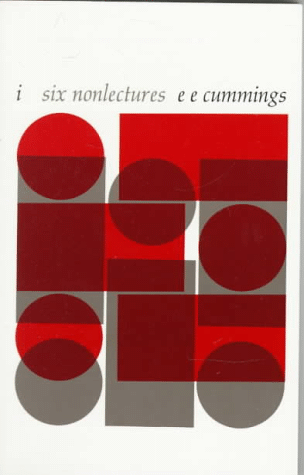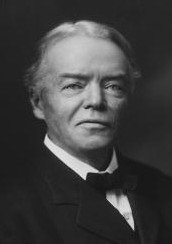i: six nonlectures

First published by Harvard University Press in 1953 and never out of print, i: six nonlectures are the six Charles Eliot Norton "lectures" which Cummings delivered in the Sanders Theatre at Harvard University in 1952-1953. As the title indicates, the the book is about Cummings' lowercase "i" --his self. In the first three nonlectures, Cummings talks about the influences that formed that self--his family, his early life in Cambridge, MA, his reading, and his encounters with notable places: Norton's Woods, New York City, and Paris. He ends each nonlecture with readings from his own and others' poems. The last three nonlectures are devoted to Cummings' writings--his poems, plays (Him and Santa Claus), and prose works (The Enormous Room and Eimi). Written in the poet's idiosyncratic style, these nonlectures are amusing, entertaining, and enlightening, telling you more about the Cummings world-view than any of his other books.
Order from Amazon.com
Notes for E. E. Cummings' i: six nonlectures [1953]
(8) my father: Cummings' father, Edward Cummings, was a sociology professor and later a Unitarian minister. When he was in his teens and twenties, the poet rebelled against his father, but later saw him as a hero of the self (see Kennedy, Dreams 100-104; 161-163; 205-206; 385-386 and Kennedy, Revisited 111).
(8) a spiritual roofgarden = most likely, the Rev. Cummings was referring to fancy rooftop restaurants (complete with dance-band orchestras, etc.), popular among the bourgeoisie at the turn of the last century. In his sermon-speech, "A Predominant Emphasis on Social Ideals and Endeavors" (1913), Cummings' father discusses how he interprets Jesus' pronouncement that "The kingdom of Heaven is at hand" (Matthew 4:17):
He [Jesus] meant Plato's ideal kingdom of Heaven was at hand. He did not mean that ridiculous spiritual roof-garden in the next world where the elect few of the "redeemed" are supposed to rejoice in everlasting bliss, in utter disregard of the endless agonies of the damned below. That is a barbarous and ridiculous conception of the kingdom of Heaven. At best, according to that ridiculous religion, our ancestors seemed to think there was going to be very little to do in that heaven, except join the choir and sing loud enough so that you should not hear the moans of the people in the basement; and some even thought one of the joys of heaven was to be found in looking over the battlements of this spiritual roof-garden and congratulating yourself that you were not in the burning lake of brimstone and fire below. Obviously, anybody who really deserved to be in heaven would immediately insist on starting a social settlement in hell. And in spite of all his narrowness and limitations, Plato's heavenly ideal was far more what Jesus had in mind than this old Christian conception. (51-52)
(9) William James (1842-1910): Pragmatist philosopher, early psychologist, and brother of novelist Henry James.
(9) concentration camp: During World War I, Cummings was jailed for supporting his friend Slater Brown, who wrote letters home saying that the Germans were probably not such bad folks after all. Cummings’ book about this experience is called The Enormous Room.
(11) nothing false and possible is love: first stanza of a sonnet by Cummings (CP 574). The next line of the poem reads: "must’s a schoolroom in the month of may:"
(25) professor Royce: Josiah Royce (1855-1916), professor of philosophy at Harvard, colleague of James. See note to "curtains part" (CP 230). Photo of Josiah Royce (with bow tie) at right.
(32) Norton's Woods, formerly the estate of Charles Eliot Norton (1827-1908), and currently the grounds of the American Academy of Arts and Sciences. Links to accounts of the visits of Cummings Society members to 104 Irving St., Norton's Woods, and beyond may be found on the contents page for Spring 20 (2013). Of course, by mentioning Norton's Woods and the "palace" of Charles Eliot Norton, Cummings was taking the Norton Lectures further into the realm of "nonlectures," which speak of childhood adventures and "trivialities" like Professor Royce's "necktie crisis" (6).
(48) Howard Street . . . Scollay Square Howard St. was in Scollay Square, Boston, site of the Old Howard Theatre, a burlesque house. Long since demolished by "illustrious punks of Progress" (CP 438), Scollay Square and the Old Howard were for years "famous for supplementing the curricula of Harvard students. 'Always Something Doing, One to Eleven, at the Old Howard' read its ads in the Boston Globe, followed by the titillating phrase, '25 Beautiful Girls 25'" (Park). See also the web page "A brief, pictorial history of Scollay Square."
(48) Bernhardt = Sarah Bernhardt, French actress, born Rosine Bernhard (1844-1923).
Pavlova = Anna Pavlova (1881-1931), Russian ballet dancer. Nix On The Glowworm = Nix on the Glow Worm, Lena, a comic song from 1910 with lyrics by Ballard Macdonald and music by Harry Carroll. Cummings misremembers: Pavlova actually danced to "The Glow-Worm" (1902), a musical composition by Paul Lincke. "Nix on the Glow Worm, Lena" is about a certain Lena who plays "The Glow-Worm" badly.
Link: Pavlova dancing "The Dying Swan.
(48) Polaire = Emilie-Marie Bouchard (1879-1939), French actress and cafe-concert singer. Polaire singing "Tchique Tchique." Another site on Polaire.
The Turkey Trot and The Bunny Hug = Popular dances.
Everybody's Doing It [Now], Alexander's Ragtime Band, Has Anybody Here Seen Kelly, There's A Little Bit Of Bad In Every Good Little Girl, On The Banks Of The Saskatchewan, and Here Comes My Daddy Now (Oh Pop! Oh Pop! Oh Pop!) = Popular songs, circa 1911-1916. Here's a performance of the chorus from "Here Comes My Daddy Now" (lyrics by L. Wolfe Gilbert, music by Lewis F. Muir):
Here comes my daddy now (oh pop! oh pop! oh pop!)
Here comes my daddy now (oh pop! oh pop! oh pop!)
See that grip in hand,
It holds something grand
That he brought for me
From across the sea.
Here comes my daddy now (oh pop! oh pop! oh pop!)
Here comes my daddy now,
And I will not have to pine,
Here comes that man of mine,
Here comes my daddy now.
Links:
- Complete performance of "Here Comes My Daddy Now" (Collins and Harlan, 1913)
- Paul Whiteman & Band performing "Everybody's Doing It Now" [1911]
- "Everybody's Doing It Now" (performed by Nancy and Jack Charman)
- "Alexander's Ragtime Band" [1911] (mp3 download from Project Gutenberg)
- "There's a Little Bit of Bad in Every Good Little Girl" [1916] (mp3 download from Project Gutenberg)
(49) Gertrude Hoffman = vaudeville dancer and leader of a troupe known as the "Hoffman Girls." She was the first in North America to perform (albeit in pirated versions) dances of the Ballets Russes. See "Gertrude Hoffman" (Dance Collection Danse).
Mr. Sumner = John S. Sumner, "executive secretary of the New York Society for the Suppression of Vice" (Daniels 81).
(50) lugete, o Veneres: Catullus, poem 3, "O Venus and her cupids / and all that's moved by beauty in man, mourn / for my sweetheart's sparrow is dead." See the note to the poem "o pr" (CP 392). See also the notes to EIMI for pages 323 / 312 and 447 / 426.
(51) labuntur anni: Horace, Odes II.14, Ah, Postumus, Postumus, how fleeting / "the swift years--prayer cannot delay / the furrows of imminent old-age / nor hold off unconquerable death." (Cummings refers to this poem at least three times in the Complete Poems. See notes to CP 234, CP 492, and CP 986.)
(51) Ποικιλόθρον', ἀθάνατ' Ἀφρόδιτα = Poikilothron' athanat' Aphrodita = the first line of Sappho's "Hymn to Aphrodite": "On the throne of many hues, deathless Aphrodite" (Rayor 51). See also Elizabeth Vandiver's translation: "Hymn to Aphrodite."
(51) that glorious human being = poet John Keats. Cummings quotes from Keats' letter to Benjamin Bailey, November 22, 1817.
(54) whose any mystery . . . Cummings quotes here from lines 7-8 of his sonnet "you shall above all things be glad and young" (CP 484).
(68) 144 should read "1944."
(79) I drew a picture of it —visible on the covers of the 1927 and 1955 editions of Him and reproduced on our Him page. Cummings also recorded this "artist-as-acrobat" scene on his first album, E. E. Cummings Reading His Poetry (1953), now called Essential E. E. Cummings (click on "Audio Excerpt"). His nonlecture commentary on the scene was reprinted in the liner notes to the original LP.
(111) believing and thinking automation should read "believing and thinking automaton."
Works Cited
- Cummings, Edward. "A Predominant Emphasis on Social Ideals and Endeavors." Proceedings at the Forty-Sixth Annual Meeting of the Free Religious Association. Boston: Free Religious Association, 1913. 47-57.
- Cummings, E. E. Complete Poems, 1904-1962. New York: Liveright, 1994. Abbreviated CP.
- Daniels, Jonathan. The Time Between the Wars: Armistice to Pearl Harbor. Garden City: Doubleday, 1966.
- Kennedy, Richard S. Dreams in the Mirror: A Biography of E. E. Cummings. New York: Liveright, 1980.
- ---. E. E. Cummings Revisited. New York: Twayne, 1994. [Twayne's United States Authors Series No. 637.]
- Rayor, Diane, ed. and trans. Sappho's Lyre. Berkeley: U of California P, 1991.

